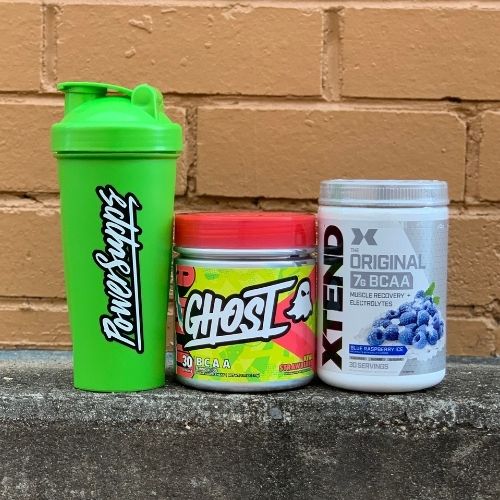Supplements
When should you take bcaas?
So you have your BCAAs and know that they are effective when training. But you still may be slightly unsure of exactly when to take BCAAs. More specifically, should take BCAAs before or after a workout? Trust us, this is not an uncommon thought process for most. We are going to help clear up a few of the questions you might have surrounding your trusty BCAA’s. When should you take bcaas and how to get the most rewards from their benefits.
What are BCAAs?
BCAAs or branched chain amino acids are referred to as the building blocks for the body. BCAAs make up a third of our muscle mass and are essential for a number of reasons. Our bodies require BCAAs for a number reasons with retaining muscle mass being the most commonly known. Improving performance via the stimulation of muscle protein synthesis, maintaining an anabolic environment and for overall muscle growth and recovery are among some of the others.
BCAAs are known as essential amino acids and include: leucine, isoleucine, and valine. All of which necessary in order for muscle protein synthesis to occur in our bodies.
The Composition of BCAAs
The unique chemical structure of BCAA’s mean that they are unlike other amino acids. They are absorbed directly into the muscles rather than through the digestive system. This process is much more rapid and efficient to that of the other amino acids. It makes them a valuable tool especially when it comes to muscle growth, performance and recovery.
Benefits of BCAAs
BCAA’s do indeed have a number of benefits. Whether your goal is fat loss, muscle gain or you’re an endurance athlete, BCAA’s are highly beneficial and versatile to consume at virtually anytime of the day and by a broad range of individuals.
Benefits of BCAA’s include –
- Aiding in muscle protein synthesis
- Enhancing muscle recovery and decrease muscle soreness
- Reducing exercise fatigue – both central and peripheral –
- Retaining and preventing muscle loss
- Strengthening the immune system
Science-based Evidence for when to take your BCAAs
As we have noted above, BCAA’s are extremely versatile and can really be consumed at anytime. But when really is the best time to take your BCAA’s and does the timing matter?
Consuming BCAA’s Pre Training
The most common time for most to consume BCAA supplements is prior to training. Generally speaking if you begin sipping on your BCAAs 15-30 minutes prior to training you will give the amino acids some time to start working and allow you to begin reaping the rewards that they have to offer.
Taking BCAAs before training will help increase energy and stamina while you are training. It can also help to prevent muscle breakdown during your workouts.
BCAA’s are called free-form and require very little digestion and are rapidly and easily absorbed into the bloodstream. This extremely efficient process means that they are able to be utilised by the muscles during exercise.
During physical activity muscle protein is in a constant state of turnover. And particularly as we train, muscle protein synthesis is downregulated. By consuming BCAAs before and during exercise muscle protein breakdown is reduced. Muscle protein synthesis is increased in the post-exercise period which can lead to better recovery.
BCAAs provide a steady energy source and their muscle-protecting effects can be had right from the start of your workout. Ideally, the earlier you take them the better.
Consuming BCAA’s Post Training
Consuming BCAA’s after your training session will aid in reducing muscle catabolism or breakdown and kickstart muscle protein synthesis and recovery.
A post training meal can be difficult to not only stomach due to a supressed appetite, but also too it takes longer for your body to digest. As we know, BCAA’s are free-form and their protein components are very easily absorbed. Delayed onset muscle soreness can be greatly reduced by BCAA supplementation. By consuming your amino acids following training, the recovery process will be initiated asap. It will have a positive effect on the body’s repair processes.
BCAA’s as an Intra-workout
Valine is the amino acid that is key in providing energy during exercise. Tryptophan is taken up by the brain in quite large amounts and is then used to make serotonin. Valine and tryptophan compete for entry into the brain resulting in less tryptophan being converted to serotonin. The overall result of this is that it allows your muscles to contract with more force for a longer time before becoming fatigued.
The fatigue that is experienced during exercise is partially due to a decline in the concentration of serotonin levels. Supplementing with BCAA’s during exercise will ensure that the amino acids are continually being circulated and topped up throughout your workout.
BCAA’s for Endurance Activities and Intense Training Sessions
Studies tend to indicate that BCAA levels in your blood peak at about 30 minutes after consumption. Knowing this, sipping on your BCAAs prior to your training session will allow the fatigue reducing benefits of BCAAs. When taken before a long training session or endurance type activity, BCAAs can act as an additional energy source to muscles after the glucose stored in our muscles is depleted.
The more intense and the longer the workout, the more branched-chain amino acids will be used for fuel. Supplementing with BCAAs means you will be able to train more intensely and for a longer period of time. This is generally what is required for more apparent body decomposition goals.
Taking BCAA’s During a Weight Loss Phase
It is not too uncommon to lose a small amount of muscle mass when you are entering a dieting phase. Muscle loss and fat loss tend to somewhat go hand in hand during a hypocaloric diet. This can also be common during intense training sessions or endurance activities.
BCAA’s can ultimately be your best ally here if you are wanting to preserve the muscle mass that you already have and to support any muscle repair. BCAA’s will provide your body with the amino acids it requires to counteract the effects of dieting or bouts of intense exercise.
As a Supplement for Vegan and Vegetarian Diets
If your preference is to follow a vegan-based or vegetarian diet, then BCAAs can be particularly advantageous in this instance. When consuming predominantly plant-based protein sources BCAA’s and other amino acids are not always in bountiful quantities.
Supplementing with BCAAs means that BCAA may enable you to hit your targets for amino acids and lead to performance enhancing effects during exercise.
BCAA’s and Fasted Training
If you have a preference for fasted training then taking a BCAA’s supplement will ensure that your muscles will have the amino acids that they require not only to repair but to also ward off any potential muscle loss and fatigue experienced during exercise.
BCAA’s for Immune Function
Many many not know but our Immune System requires BCAA’s in order to fight off infections, enhance wound healing and to protect our tissues from damage.
Consuming BCAA’s during the day and especially post-workout when immune function is down regulated will aid in aa faster recovery and protection from unwanted illness.
How to take BCAAs for Maximum Effect – Stacking with other supplements
If you are wanting to stack with some of your other favourite supplements then combining certain products with your BCAAs can enhance their effects even further. Furthermore, BCAA’s are incredibly simple and versatile enabling them to be integrated with your already favourite supplements.
BCAA’s and Pre-workout
If your a lover of pre-workout and a caffeine boost before you attack your session is your thing then adding some BCAA’s can boost your energy even further.
Pre-workouts and BCAA’s differ in the fact that pre-workouts are primarily focussed on improving your overall training performance, while BCAA’s have a focus on fuelling the muscles and supplying them with what they need to repair and rebuild muscle tissue and initiate recovery.
Pres definitely have their place however they tend to lack the muscle building benefits that BCCA’s possess. Pre-workouts have the advantage though of combatting fatigue and improving endurance in a way that BCAA’s don’t. Combining both will allow you to reap the benefits all round.
BCAA’s and Creatine
If you already have Creatine as part of your collection of supplements then taking your BCAA’s and creatine together is an incredibly powerful combination for muscle protein synthesis, ATP production, strength and recovery.
The role of creatine is to regenerate ATP. Our muscles only have a limited amount of creatine. Supplementing with creatine will give your body a greater ability to produce ATP and hence the energy available for physical activity.
There is certainly no harm in stacking these supplements together as they are both highly effective muscle-building amino acid supplements, especially if your goal is to build muscle mass.
BCAA’s and Citrulline Malate
Citrulline delays fatigue and increases ATP production and is also well known as a powerful nitric oxide booster. It works by removing ammonia and allowing you to experience less fatigue and hence increasing energy levels. Combining with BCAA’s will supercharge this fatigue combatting formulas to ensure that mental fatigue is also reduced.
BCAA’s and Carbohydrates
Glycogen stored are depleted following physical activity. When it comes to reducing the markers of muscular fatigue, BCAA’s have been shown to be incredibly effective to carbohydrate formulas alone.
Adding a dose of carbohydrates to your favourite BCAA formula will offer you more comprehensive nutritional support that your body requires particularly post training especially to promote muscle recovery.
So What Are Our Tips for Choosing BCAA Supplements?
As you can now see, timing is an important factor to consider when using BCAAs. If you are wanting to reap the rewards of all that BCAA’s have to offer, then choosing a high quality product is important.
Here are some of our tips to help you choose the best option for your needs and goals.
Take a look at the ingredient list
Always check the ingredients list to ensure you’re not taking in anything you don’t want to consume. BCAA formulas can differ. So be sure to look at what the ingredients are so that the formula provides you with all that you are after.
Check the dosing and serving size
Common questions to consider when choosing your BCAA supplement is such things as:
- How many grams of BCAAs are you getting in each serving of your BCAA supplement?
- What constitutes a serving size? One scoop or two scoops?
- What is the BCAA ratio of your product?
What BCAA ratio should you look for?
The most ideal BCAA ratio is 2:1:1. As we have already touched on with the three amino acids being leucine, isoleucine and valine. Leucine is what offers the most protein benefits in regards to muscle protein synthesis.
Making sure that your BCAA formula has a greater portion of leucine over the the other other two amino acids will ensure that strength and muscle growth are favoured.
The Take Home
BCAA’s are an incredibly versatile and effective supplement that provides many benefits for the user. From muscle protein synthesis, to repair and recovery to stacking with other supplements to supercharge their overall effectiveness, BCAAs are a supplement worth having.
BCAAs can be taken before, during or after exercise with each having their own advantages in relation to the effects of the amino acids themselves. Taking BCAAs reduces muscle catabolism and increases muscle protein synthesis while also providing fuel for your workouts.
Whether you are wanting to gain muscle mass, lose some weight or train regularly, BCAAs are must-haves for any individual and could be the answer for any aspects of your routine that may be lacking.

